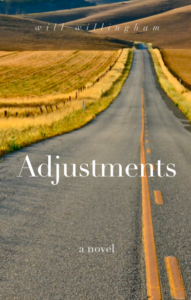And though our separation, it pierced me to the heart
She still lives inside of me, we’ve never been apart—Bob Dylan
And then, these journeys
and my sea of renewal—Pablo Neruda
What makes a house a home—someone to listen to your music and share your cookies; a tenant to shoot pool and banter with; a friend to cook for and play checkers; certainly a house with a dog or a cat; maybe a house with only the books and their characters or poetry that have kept you company? Can you come home to a place you’ve never really left? What makes this possible?
Maybe first ask, what makes this difficult?
In the last chapters of Adjustments, by Will Willingham, everyone comes home, not because they have been physically away, but because they open the doors to their hearts. They give what they have bridled against losing for years.
What allows this to happen is a novel about unrequited love; the wakes left from the passing of loved ones; discord and empathy; accident and acceptance; and in the end for Will Phillips, an act of liberation.
Adjustments is easy to read because of Willingham’s ability with revealing and entertaining dialogue—the romantic scenes, the dinner scenes are truly cinematic in the mind of the reader. But the story of Will Phillips’s awakening does what any excellent novel requires: a deeper reading, a slower reading, an attention that matches the care with which it, obviously, was written. The final pages ask you to begin a second read.
With excellent rendering, the mysteries surrounding Will Phillips, Barbara Roberts, Joe Murphy, Pearl Jenkins, and Cameron Julian are carried along for nearly the full five-hundred plus pages.
What does Joe mean to this story? I said in an earlier discussion that Joe seemed to be an angel for Will, someone to urge him relentlessly to engage in his life and take what it is offering. Will does not see how Joe takes in stride a heart attack. And when Joe accompanies Will to the beer truck accident, he turns up a beer keg and opens a bottle of the spilled Coors, while Will agonizes over the rudeness of Karl Wainwright, the tow truck operator.
Joe asks Will if he has complicated his life. Will responds yes, but, “You have also added something that I’ll one day understand as good, even if today I can’t for the life of me figure it out.” Joe smiles and congratulates Will on learning to wait for the arrival of good things.
We learn finally the full story of Barbara, who, like the doll’s head, remains a bodiless resident in Will’s memory and still causing him strife. The final chapters reveal the story of the childhood fire that burned Will’s arm at the cajoling of Barbara for Will to “be a man.”
It takes the full cast of Adjustments’s characters, two cats and a dog, and no less than eleven poets to bring Will to his senses, forget about Barbara, and find “the good parts” in a real relationship with Cameron. But it is this effort that also makes whole each individual’s sense of home.
In reading and rereading Adjustments, I was reminded of “Little Gidding” where T. S. Eliot writes:
We shall not cease from exploration
And the end of all our exploring
Will be to arrive where we started
And know the place for the first time.
Photo by Ian Sane, Creative Commons license via Flickr. Post by Richard Maxson.
Browse other book club discussions of Adjustments:
November 20: Chapters 1 – 17
December 4: Chapters 17 – 34
December 11: Chapters 34 – 52
Get Inbox Delivery of Book Clubs
Our book club discussions are a patron perk.
$5 patrons can opt to get each book club edition delivered in full straight to their inboxes, with a photo and link to the discussion!
- Pandemic Journal: War is Over (If You Want It) - January 7, 2021
- Pandemic Journal: An Entry on How We Learn - April 23, 2020
- Adjustments Book Club: Homecomings - December 11, 2019



Bethany says
“Adjustments is easy to read because of Willingham’s ability with revealing and entertaining dialogue…” True.
It’s also fascinating to discover the inner and outer life of the character Will. There are the new (to me) and intriguing revelations about daily life in insurance adjusting, as well as the inner thoughts, struggles, and humor of the character. I’ve got to keep reading…
Richard Maxson says
There are many metaphors depicting the inner and outer life of Will Phillips and Joe Murphy. Once I got to this realization as you have, it was fun watching for them. I’m hoping someone mentions the one that is my favorite, done, as are so many things, with subtle humor. I don’t want to be a spoiler.
Will Willingham says
I am looking forward to hearing what this is, Rick. 😉 I am often as surprised and delighted as anyone about these things, which, apparently, I wasn’t always aware of on a conscious level.
Richard Maxson says
I am assuming everyone has reached this far in the reading. The funniest and if not the most apropos metaphor for Will’s interior vs exterior life was in Chapter 48 where Will dressed for the dinner Pearl was making.
He put on a pair of ragged worn-thin jeans for the party. Once there, he began worrying if his plaid underwear would show through the threadbare seat of his pants.
I spoke of Will’s colors illuminated by the dance in the stained glass window colors reflected on the floor of his room. So I thought the underwear/jeans mention was a more direct way of showing his reticence to show his colors publicly.
Another instance involved his need to close the glove box that would not close. He kicked at it relentlessly until it fell off its hinges and Will broke down in tears. As it turned out it was the Barbie doll head preventing the closing, and it was Cameron who discovered this, I thought this was a metaphor for how Will let Barbara screw up his life without seeing her.
Will Willingham says
I love these observations, Rick. The colors, of course.
And yes, about Barbara being the thing in the way of so much for Will…
L.L. Barkat says
Fascinating. 🙂
I thought the Barbie head went further. There was a sense in which it was emblematic of Will himself—of the side of him that had always been misconstrued as starkly feminine (rather than gentle-man-ish). This side of him, incarnated in the doll’s head, had already been abused in some way (the Barbie head, after all, is separate from the body and is lost until he picks it up), and now it is further abused in the kicking scene, though he doesn’t know he is abusing it. Only Cameron makes the discovery, when she removes the disembodied head and finds it now has a slice in it from the glove box latch. “This explains a lot,” she says. And how.
To me, when Joe then later tenderly braids the hair, it’s like a picture of what he’s been doing all along with Will: accepting all parts, affirming all parts of his being, even that which had been construed as feminine and had been mocked and questioned by others.
Will Willingham says
So that’s interesting, and maybe for me a matter of perspective. I went through so much of this process wondering when and how the story would explain the Barbie head.
But in fact, then, perhaps it’s what the Barbie head explains.
The wound from the glove box latch was (remains) painful for me.
Will Willingham says
Bethany, it is always interesting to me how the things that we think may be mundane about our particular daily activities, whether the particularities of our jobs or our work at home with family, but that can be super interesting to others because they aren’t the everyday things.
Hope you keep reading, and enjoying. 🙂
Bethany says
Thanks for the responses, guys. Rick, I am trying to think of which reference this is! Would I have seen it if I’ve only read 70% so far? Hm…now you’ve got me wondering.
Will, I can’t believe I knew so little about what insurance adjusting entails. One wonder to me is how drastically the work environment can change in a day. The swings from say, a stable to the office are interesting. And what is required for a person to effectively communicate in those various realms with all kinds of people is admirable. I’m looking forward to tonight’s before-bed-reading installment. 🙂
Sandra Heska King says
“But the story of Will Phillips’s awakening does what any excellent novel requires: a deeper reading, a slower reading, an attention that matches the care with which it, obviously, was written.”
This.
Will Willingham says
🙂
It has been more challenging to me than I expected to wait for that slow reading… But I also understand that is the way this one unfolds for most. 🙂
Richard Maxson says
One more thing about the metaphors. I believe when we write deeply, the situations where we find the characters will demonstrate our intimacy with the characters by “dressing” them, “placing” them in ways that reflect the inner world/outer world, even when it is not fully intentional.
I might be wrong about this, but it seems that way when I read most stories, especially the well-written ones. 🙂
Will Willingham says
This makes sense to me, Rick. So much happens below the surface even for the writer that I think these things often (for me anyway…) at a subconscious level. I found myself knowing these characters so deeply after a time that it makes sense that they, especially Will, just do things that are consistent with that person, and it provides a cohesiveness that wasn’t necessarily mapped out. (If I *tried* to do it, it would look very obvious and clunky, I imagine.)
Richard Maxson says
I’m doing some research right now on (one of) Bob Dylan’s masterworks, “Visions of Johanna.” In that research I came across a comment Dylan said (and I’m paraphrasing) about the song “It’s alright Ma (I’m only bleeding), I don’t know how I got to write these songs. I try to write like this now and I can’t. I can do other things, but not like this.
It is s strange frame of mind the writer takes, I think. The deep writer is both in a trance and supremely conscious simultaneously. This morning I read a Neruda poem titled ‘Horses.’ Tell me from where does someone write like this:
“Hardly had they surged forth, like flame,
than to my eyes they filled the whole world,
empty till then. Perfect, ablaze,
they were like ten gods with pure white hoofs,
with manes like a dream of salt.
Their rumps were worlds and oranges.
Their color was honey, amber, fire.
Their necks were towers
cut from the stone of pride,
and behind their transparent eyes
energy raged, like a prisoner.”
I mentioned the scene where Will and Cameron dance in the lights cast on the floor through the stained glass. This scene began pages back in the dark street with a woman in a dark running suit, a dog named Finn (I’m still curious was it Huckleberry or Finnegan?). I wandered with the story through a fall and moments of dizziness for Will; through what seemed like a parable about a diminutive Judge,who conquered a bully; Into a quest for spirits and finally a dance of what amounted to a moment of freedom for Will.
It would have been a pleasure to have been in your head when you conceived this little journey. It cast my memory back to when Joe got Will to play the concertina.
Will Willingham says
That moment of dancing really was a revelation for me, Rick. Will is not the kind of guy that would likely agree to dance if asked, let alone ask someone to join him (or dance there by himself!). Or so it would seem. So he surprised me here. It may have been the blow to the head. Or the intoxicating effect of a beautiful woman.